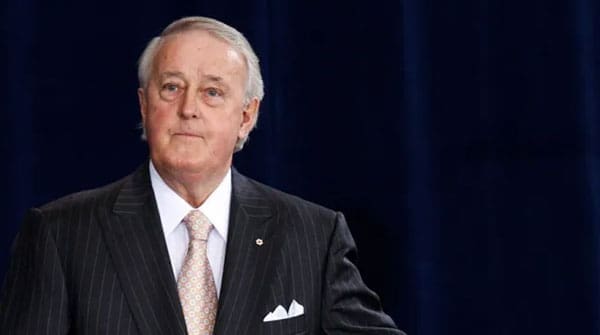Mulroney successfully navigated the intersection of his Catholic faith and politics
 When Pope (now St.) John Paul II arrived in Ottawa in 1984, the first pontiff to visit this country, greeting him in Ottawa was Canada’s 18th Prime Minister, Brian Mulroney, one of 10 Catholics who have held that office since 1867.
When Pope (now St.) John Paul II arrived in Ottawa in 1984, the first pontiff to visit this country, greeting him in Ottawa was Canada’s 18th Prime Minister, Brian Mulroney, one of 10 Catholics who have held that office since 1867.
The “little guy from Baie Comeau,” raised by Irish Catholic working-class parents, had come a long way from his childhood job of distributing advertising flyers to receiving dignitaries of the Holy Father’s stature.
From 1984 to 1993, Mr. Mulroney led the country as the Progressive Conservative Prime Minister after steering his party to a landslide victory and breaking 26 years of consecutive Liberal rule (minus the short-lived government of Joe Clark’s PCs).
But now the booming baritone voice that famously broke into the song “When Irish Eyes Are Smiling” with U.S. President Ronald Reagan has been stilled forever, and the smile that charmed friends and political opponents alike will become a distant memory.
 Brian Mulroney |
| Related Stories |
| Brian Mulroney and Ronald Reagan are together again
|
The flag on Parliament Hill has been flying at half-mast since the announcement of Mulroney’s death on Feb. 29 shook the nation. An outpouring of condolences and tributes is still flowing from across the country and around the world, while a state funeral will be held on Mar. 23 in Montreal.
“We join with so many from throughout Canada who are deeply saddened to hear of the passing of former Prime Minister Brian Mulroney. As with all those who are called to the vocation of political life, we give thanks to the Lord for his many years of service to our country, most notably as the 18th Prime Minister of Canada,” read a statement from Toronto Archbishop Francis Leo.
Mulroney’s religious and personal identities were forged by his upbringing as a Catholic of Irish descent. Born and raised by working-class Irish Canadian parents in Baie Comeau, a small, isolated town approximately 400 km from Quebec City, his daily life in his childhood home was centred on the Catholic faith.
Education received in Catholic schools further reinforced his Catholic worldview. The first school Mulroney attended was the Académie St. Amélie, a Catholic primary school run by nuns within easy walking distance of his home. An honour student, he also served as an altar boy in his parish.
At age 14, he was sent to St. Thomas College in Chatham, N.B., another Catholic institution. He later attended St. Francis Xavier University in Antigonish, N.S., where he excelled at public speaking and debating. After graduating with a degree in political science, he went to law school at Quebec’s Laval University, where he built a network of friends who would play a prominent role in Canadian politics for years to come.
He achieved success as a lawyer and businessman before he was elected leader of the Progressive Conservative Party, leading the party to one of the biggest landslide victories in Canadian history in the 1984 election. Winning 211 of 282 seats in the House of Commons, including more than three-quarters of the seats in Quebec, was a remarkable breakthrough for the Progressive Conservatives. Riding a wave of popularity, particularly with Quebec voters, he won a second majority government in 1988.
But his glory days came to a crashing halt shortly before the election of 1993. By this time, unpopular measures such as the Goods and Services Tax and the failure of the Meech Lake and Charlottetown Accords, intended to include Quebec in the constitution, had seen his approval rating plummet to an all-time low, inducing him to resign and hand over power to Kim Campbell, who took the heat for the former PM’s unpopularity when the PCs were reduced to two seats.
Throughout his career, as he moved from the highest peaks of political and professional success to the deepest valleys of defeat and disappointment, Mulroney remained a steadfast Catholic in his private and family life. He did not, however, indulge in overt displays of his faith in his public life or allow his religious beliefs to override what he thought was good for the country.
“Compared to some other prime ministers, whatever faith he had was pretty private. John Turner was known to take his faith seriously, prioritizing attending Mass, for example, and I think the same can be said of Paul Martin,” Jonathan Malloy, a political science professor and expert on prime ministerial leadership at Ottawa’s Carleton University, said. “Pierre Trudeau was also a person of faith, though somewhat more in an intellectual sense.”
Malloy added that Mulroney’s approach to keeping his religion more as a private matter is best illustrated in how he approached abortion.
“Like his Catholic contemporaries Pierre Trudeau, Joe Clark, John Turner, Jean Chretien and Paul Martin, he felt that religion and politics were mostly separate and should remain that way,” he said. “This is best seen in how each approached abortion, in most cases, expressing personal hesitancy and yet being more or less pro-choice politically. Mulroney was the only one (who) actually pursued abortion legislation, but only because the existing law was struck down; he pursued compromises that satisfied no one and eventually abandoned them.”
Abortion and euthanasia, however, are not the only litmus tests of how a politician brings his religious values to the public square. Peace, social justice, and care for the poor, the marginalized and the oppressed are also central to Catholic social values. In terms of these, Mulroney was a highly consequential prime minister who supported Nelson Mandela’s fight against apartheid in South Africa and launched the Royal Commission on Aboriginal People, the Canadian Multiculturalism Act, the Court Challenges Program and the Acid Rain Accords.
“Politicians have a unique opportunity: they can help individuals, yes, but they also have the power to create the very conditions by which people can flourish, which has a much larger impact,” Pope Francis wrote in Fratelli tutti in 2020. “What we need is a better kind of politics, one truly at the service of the common good.”
Measured against this standard, Mulroney was one who sought the common good, and in so doing, changed the economic and social landscape of Canada.
He will take his place as a towering figure in Canada’s history, having won the respect of Canadians regardless of party affiliation and of friends around the world.
Susan Korah is an Ottawa-based journalist. This article was submitted by The Catholic Register.
For interview requests, click here.
The opinions expressed by our columnists and contributors are theirs alone and do not inherently or expressly reflect the views of our publication.
© Troy Media
Troy Media is an editorial content provider to media outlets and its own hosted community news outlets across Canada.

